Best Steam Deck SSD 2024: easy internal storage upgrades
If a Micro SD card just isn't enough.
Choosing the best Steam Deck SSD is a sure-fire way of increasing your internal storage on your Steam Deck without compromising on performance. Unlike going with one of the best micro SD cards for Steam Deck, though, an SSD is a more permament solution that replaces your Steam Deck's original SSD (if present) with a larger (and often faster) option. It also makes for a perfect upgrade if you're going to be sinking some funds into the new Steam Deck OLED, and you want to maximise your storage right from the off.
All these drives have one big thing in common - their smaller form factor. Each of the drives listed below are M.2 2230 drives, meaning they are designed to fit in smaller spaces, such as inside the Steam Deck, or ROG Ally, or similar handheld consoles. Note that the Steam Deck is limited to PCIe 3.0 speeds, but it happily accepts PCIe 4.0 drives too - you just won't be accessing their full potential. Later handhelds like the ROG Ally and Legion Go, on the other hand, do offer PCIe 4.0 support and therefore will see increased speeds.
It's worth noting also that the installation process is a little fiddly, but perfectly achieveable with a little patience and this handy iFixit guide that explains it all.
Click the links below to jump right into the drive you're most interested in, or scroll on for our recommendations in full. We've chosen options from a variety of manufacturers, so you're sure to find one you like.
Best Steam Deck SSD 2024
- Best Sabrent Steam Deck SSD: Sabrent Rocket 2230 1TB
- Best Corsair Steam Deck SSD: Corsair MP600 Mini 1TB
- Best Micron Steam Deck SSD: Micron 2400 2TB
- Best WD Steam Deck SSD: WD SN770M 2TB
- Best Addlink Steam Deck SSD: Addlink S91 2TB
- Best Fanxiang Steam Deck SSD: Fanxiang S700 1TB
Best Sabrent Steam Deck SSD: Sabrent Rocket 2230 1TB
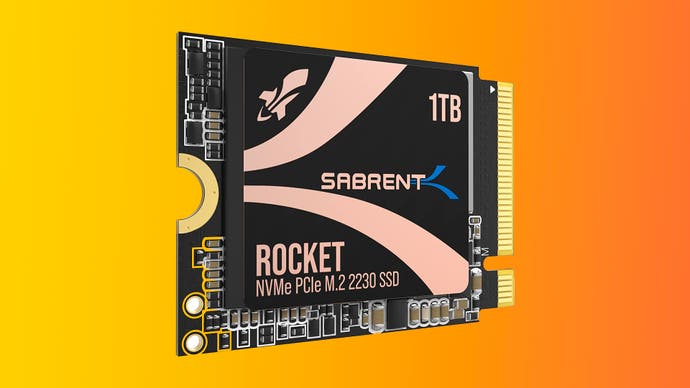
The £85/$90 Sabrent Rocket 2230 1TB makes for an excellent SSD to slot into your Steam Deck, and for what seemed like a while, was actually one of the only options that presented itself.
On paper, the Rocket 2230 is quite a quick option, offering sequential speeds of up to 5000MB/s and random speeds of up to 800K IOPS with its PCIe 4.0 interface. With this in mind, it is limited by the Gen 3 speeds available on the Steam Deck, but even with this, it should offer some especially strong results - around 3500MB/s and 450K IOPS - that eclipse the default 512GB drive, which we measured at 2300MB/s and 110K IOPS
This drive is available in a wide range of capacities, with the largest being the 1TB model we've linked here, but if you want to go smaller for whatever reason, Sabrent also offers 256GB and 512GB options.
Best Corsair Steam Deck SSD: Corsair MP600 Mini 1TB

The £95/$90 Corsair MP600 Mini 1TB makes for another excellent SSD to pair with your Steam Deck, and is one we've seen subject to a few discounts at the time of writing.
Its speeds at up to 4800MB/s for sequential reads and writes make it a little slower than the Rocket 2230 above, but this is still more than snappy enough for your Steam Deck. Its random perfomance at up to 850K IOPS for reads and 1.1M IOPS for writes is better though, providing some especially snappy load times to get you into games quicker. With this in mind, the MP600 Mini will be limited by Gen 3 speeds, but it's still a quicker option than the internal drive already inside the Steam Deck, and is actually tenfold faster than the sluggish 64GB of eMMC storage inside the base model.
As for different capacities, the MP600 Mini is available just in a 1TB config, but that's still going to be a worthy upgrade, especially if you've got one of the lower capacity options.
In recent weeks, we've also spotted this newer Corsair MP600 Core Mini option, which uses QLC instead of TLC, and offers slightly quicker speeds of up to 5000MB/s reads and 3800MB/s writes. It's available in a 2TB config for £162/$190, if you'd prefer a bigger Corsair candidate.Best Micron Steam Deck SSD: Micron 2400 2TB
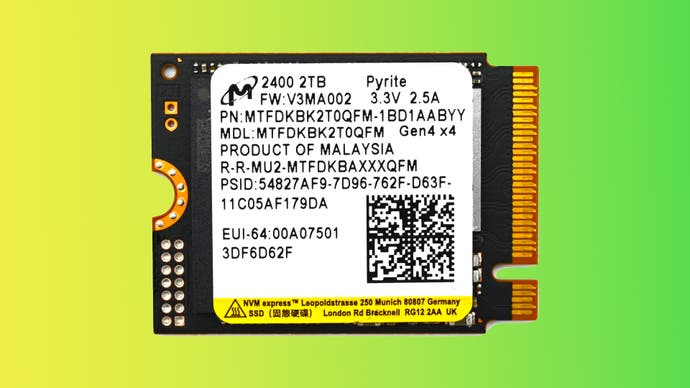
The £166/$147 Micron 2400 2TB marks out one of the newer entries into the world of Steam Deck entries that's become avaialble over the last few months, and is also seemingly one of the only drives to be available in a larger capacity.
In terms of speed, the 2400 offers quicker storage than either the Steam Deck's built-in SSD or built-in eMMC storage, which operates at up to 2500MB/s or 300MB/s respectively. By comparison, this Micron drive is rated for max reads of 4200MB/s when hooked up to a PCIe 4.0 port, although you'll probably see closer to 3500MB/s speeds given that the Steam Deck is limited to PCIe 3.0 speeds. Whatever way you look at it though, this is a significant upgrade.
The 2400 is available in a 1TB config, but it seemed right to pick out the 2TB version given it seems to have eluded other manufacturers currently, such as Sabrent and Corsair above. Opting for a 2TB drive at the very least quadruples the internal storage of your Steam Deck, given the top model offers a 512GB internal drive. At the most, going from 64GB of internal eMMC storage to a 2TB NVMe drive both massive gains in both speed and storage.
Best WD Steam Deck SSD: WD SN770M 2TB
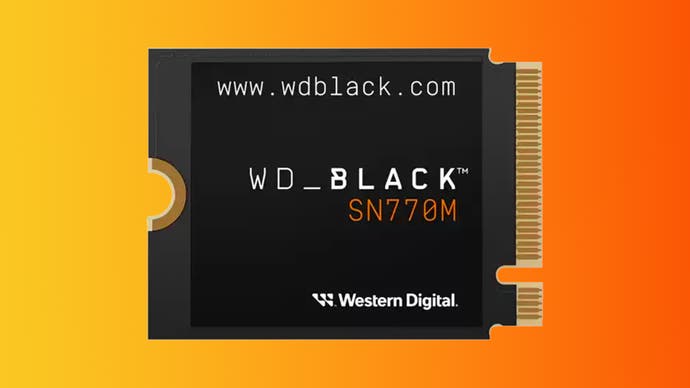
The £185/$220 WD SN770M 2TB is the latest release from Western Digital, and in the realms of Steam Deck-compatible SSDs, too. It also provides you with a larger capacity option to slot into your Steam Deck, and also provides a wider array of capacity options if you so choose.
In terms of speed, the SN770M provides some of the best numbers on this list, with up to 5150MB/s reads and 4000MB/s writes. Even if the actual speeds will be limited by the PCIe 3.0 interface, the SN770M is still capable of offering speedy storage compared to what's inside the Steam Deck already. Whatever way you cut it, it represents a major upgrade.
The SN770M is also available in both 1TB and a 512GB config, and even if you choose to opt for the smallest option, it's still going to provide you with a speed boost over the internal Steam Deck drive, or at least a doubling of storage capacity over the mid-range model.
Best Addlink Steam Deck SSD: Addlink S91 2TB
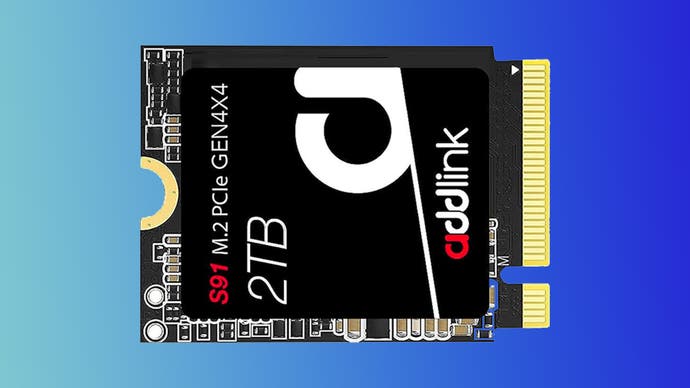
The £172/$169 Addlink S91 2TB gives you another 2TB drive to chuck into your Steam Deck for increasing the console's capacity for a decent cost.
The S91 impresses with its speed, offering results of up to 5000MB/s reads and 3200MB/s writes, which puts it firmly in the mix as one of the quickest drives in our ranking. Its random performance of up to 750K IOPS for writes and 570K for reads also impresses, allowing you to get into the game quicker, while also giving you a big upgrade over what's already inside your Steam Deck.
The S91 is also available in both 1TB and a 512GB config, and even if you choose to opt for the smallest option, it's still going to provide you with a speed boost over the internal Steam Deck drive, or at least a doubling of storage capacity over the mid-range model.
Best Fanxiang Steam Deck SSD: Fanxiang S700 1TB
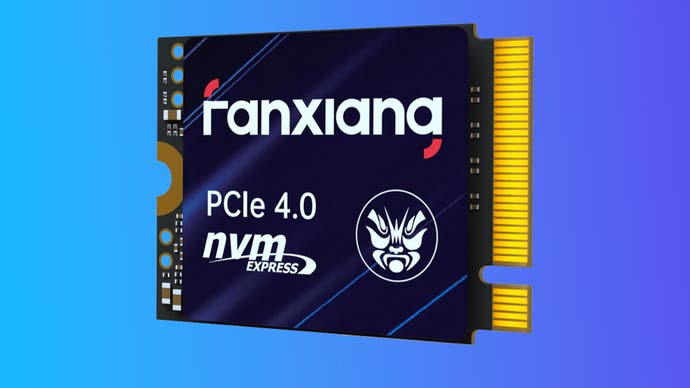
Perhaps the most recent addition to our list comes from a lesser known brand who've been making headway in offering powerful M.2 2280 drives for more afforrdable prices, Fanxiang. Their £68/$85 S700 1TB adds another solid M.2 2230 option that's ideal for slotting into your Steam Deck, or Steam Deck OLED for that matter.
Its speeds of up to 5000MB/s reads and 4600MB/s writes, which makes it one of the quicker drives available, even if it is limited by the PCIe 3.0 speeds afforded by the Steam Deck. It's available in either a 500GB or 1TB config, as described, and marks a more affordable choice compared to others from bigger brands. The fact also remains that opting for either model is going to provide you with a lot more space than any of the variants of the Steam Deck.
With that, our recommendations come to an end. I hope there's enough there to give you some food for thought for which SSD is going to be the best for you to choose to put into your Steam Deck.
Of course, we're always on the lookout for some of the best deals we can find on all manner of tech, including a slew of different SSDs, and to keep informed with those, you'll want to follow @dealsfoundry on Twitter and check out the deals sections at both Eurogamer and our sister site Rock Paper Shotgun for PC tech deals as we find them.

